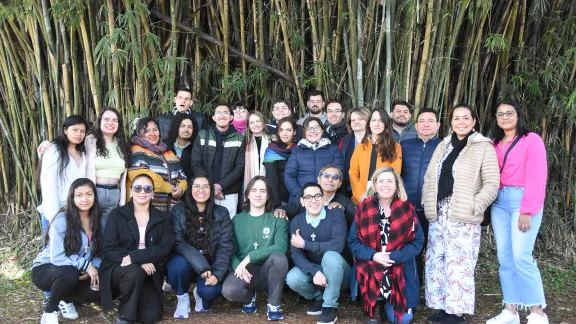
Delegates from 12 LWF member churches take part in 2nd meeting of the Climate Justice Forum for Latin America and the Caribbean. Photo: LWF/E. Albrecht
Participants at a regional Climate Justice Forum learn about best practices in caring for creation
(LWI) - A nursery for native trees and vegetables, a school which excels in environmental stewardship and an indigenous community showcasing traditional spiritual practices of care for creation. Delegates from 12 Lutheran World Federation (LWF) member churches had the opportunity to visit all three of these locations during a meeting of the Climate Justice Forum for Latin America and the Caribbean (LAC).
The second meeting of the Forum took place in Eldorado, Misiones province, in northeastern Argentina from 12 to 16 August, alongside a workshop on International Human Rights Mechanisms. The workshop covered topics such as the Universal Periodic Review (UPR), the Committee on the Elimination of Discrimination against Women (CEDAW), and their relationship with climate justice.
We gather in hope for a future where creation is central to our Christian faith.
Ingrid Kurtz, IERP climate activist
"As we gather in hope for a future where creation is central to our Christian faith, we recognize that the most valuable aspect of this meeting of Lutherans from Latin America and the Caribbean is the opportunity to learn, unlearn, and embrace diverse realities as we take action on climate justice”, said Ingrid Kurtz, a young climate activist from the United Evangelical Lutheran Church in Argentina (IERP).
The meeting of Climate Justice Forum aimed to strengthen the capacity of LWF member churches in the region to implement an effective climate justice advocacy plan. The Forum focused on identifying local priorities and synergies for 2025-2027, while also evaluating the 2022-2024 advocacy plan to highlight achievements, areas for improvement, lessons learned and best practices.
Dialogue with government representative
The agenda included a dialogue with representatives of the Ministry of Climate Change of Misiones province, as well as a presentation on the global and regional climate scenario, main processes and trends. Participants also discussed the development of the 2025-2027 plan, identifying key areas and activities to strengthen local, national and regional activities.
On the last day of the meeting, the group visited several local projects. Their first stop was the IERP community of Montecarlo, where they were greeted by Pastor Jorge Buschiazzo. He shared the rich history of the community, which is celebrating its centenary this year. The group visited a native plant and vegetable nursery run by the community as a diaconal project involving all generations. This nursery grows native trees for local reforestation and produces organic vegetables.
Next, the group traveled to Ruiz de Montoya, where Pastor Hilario Tech and engineer Martín Hanske led a tour of the Instituto Línea Cuchilla. This secondary school, one of only 16 in Argentina with ISO 9001 quality certification, incorporates environmental stewardship into its curriculum. The school promotes sustainable agricultural practices and educates students about minimizing their impact on the environment.
Respecting indigenous worldviews
Rev. Tech said: "Since its founding more than 60 years ago, the school has been dedicated to caring for creation. At Misiones, we are pioneers in this area, which is also reflected in our Christian values, emphasizing faith, life and care for the environment." The institute excels in reforestation with native species and offers electromechanical training with an emphasis on energy efficiency and waste reduction. It has also integrated solar energy into its operations, now providing 5 percent of the school's electricity.
The group's final visit was to the nearby community of Mbya Yvytu Porã, where participants learned about missionary life in the bush and the community's deep connection to nature. Ariel, a member of the community, explained the importance of the land, especially in ceremonies when people receive their spiritual names.” This experience gave Forum participants a deeper understanding of the importance of connecting with creation and respecting indigenous worldviews.
LW Program Executive for Climate Justice Elena Cedillo said: “We had the opportunity to work together on the second phase of a regional climate action plan that focuses on concrete actions to strengthen our global efforts. This plan is based on evidence of current challenges and available local solutions."


